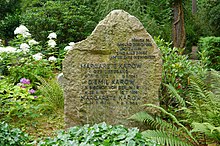Emil Karow
Emil Albert Oswald Karow (born August 22, 1871 in Prenzlau ; † July 10, 1954 ) was a German Protestant theologian and Protestant Bishop of Berlin for a short time in 1933/34 .
Life
Karow was born the son of the master baker Johann Karow and Wilhelmine Henriette Trebbin. He studied Protestant theology at the universities of Tübingen , Halle and Berlin . During his studies he was a member of the 1889 Schwarzenburg Bund - connection Tuiskonia Hall . He was born on November 12, 1899 ordained .
In 1899 he became vicar provincial , in 1901 assistant preacher in Berlin. In the same year he was also pastor in Weggun , in 1904 pastor in Lüdersdorf , in 1908 pastor in Niederfinow , in 1913 chief pastor at St. Magdalenen in Eberswalde and at the same time superintendent of the Eberswalde church district. In 1921 Karow became a member of the Old Prussian Evangelical Upper Church Council (EOK) in Berlin and Upper Church Council. In 1928 he was appointed general superintendent for the area of the Berlin city synod (Berlin city synod; area scope from before 1920) within the church province of Mark Brandenburg of the Evangelical Church of the Old Prussian Union ; at the same time he took over the chairmanship of the consistory of the ecclesiastical province , but was on leave from June 28 to July 19, 1933 by August Jäger , State Commissioner appointed by Göring for Prussian church affairs. In addition, Wilhelm Haendler was general superintendent for Berlin Land from 1911, which encompasses the so-called Berlin rural parishes, mostly in areas that were incorporated into Greater Berlin in 1920, but sometimes beyond. In September 1933, after the German-Christian reorganization of the old Prussian church at the brown general synod (September 5-8), Karow became provincial bishop for Berlin in the diocese of Brandenburg (name of the ecclesiastical province after the reorganization), and Joachim Hossenfelder was also provincial bishop for Brandenburg in Diocese of Mark Brandenburg . However, Karow retired on July 31, 1934 at his own request on March 16, 1934 .
On October 2, 1900, in Perleberg , he married Margarete Liesegang (* 1871), daughter of Pastor Hermann Liesegang in Potzlow and the Elisabeth Abbot. He had 5 children with her.
Karow's last residence was Ginsterheide 35 in Kleinmachnow, his grave is in the forest cemetery in Kleinmachnow .
Individual evidence
- ^ Hermann Goebel (ed.): Directory of members of the Schwarzburgbund. 8th edition, Frankfurt am Main 1930, p. 90 No. 1489.
- ↑ a b c Barbara Krüger and Peter Noss, “The structures in the Evangelical Church 1933–1945”, in: Kirchenkampf in Berlin 1932–1945: 42 city stories , Olaf Kühl-Freudenstein, Peter Noss and Claus Wagener (eds.), Berlin : Institut Kirche und Judentum, 1999, (= Studies on Church and Judaism; Vol. 18), pp. 149–171, here p. 158. ISBN 3-923095-61-9 .
- ↑ Barbara Krüger and Peter Noss, "The structures in the Evangelical Church 1933–1945", in: Kirchenkampf in Berlin 1932–1945: 42 city stories , Olaf Kühl-Freudenstein, Peter Noss and Claus Wagener (eds.), Berlin: Institute Church und Judentum, 1999, (= Studies on Church and Judaism; Vol. 18), pp. 149–171, here p. 151. ISBN 3-923095-61-9 .
| predecessor | Office | successor |
|---|---|---|
| Georg Burghart |
General Superintendent for Berlin city 1927 - 1933 |
himself ( as Provincial Bishop for Berlin ) |
| (1) himself ( as general superintendent for Berlin city ) and (2) Wilhelm Haendler ( as general superintendent for Berlin country ) |
Provincial Bishop of Berlin 1933 - 1934 |
Vacancy Otto Dibelius ( from 1945 provisionally as General Supervisor for Berlin ) |
| personal data | |
|---|---|
| SURNAME | Karow, Emil |
| ALTERNATIVE NAMES | Karow, Emil Albert Oswald (full name) |
| BRIEF DESCRIPTION | Bishop of Berlin |
| DATE OF BIRTH | August 22, 1871 |
| PLACE OF BIRTH | Prenzlau |
| DATE OF DEATH | July 10, 1954 |
